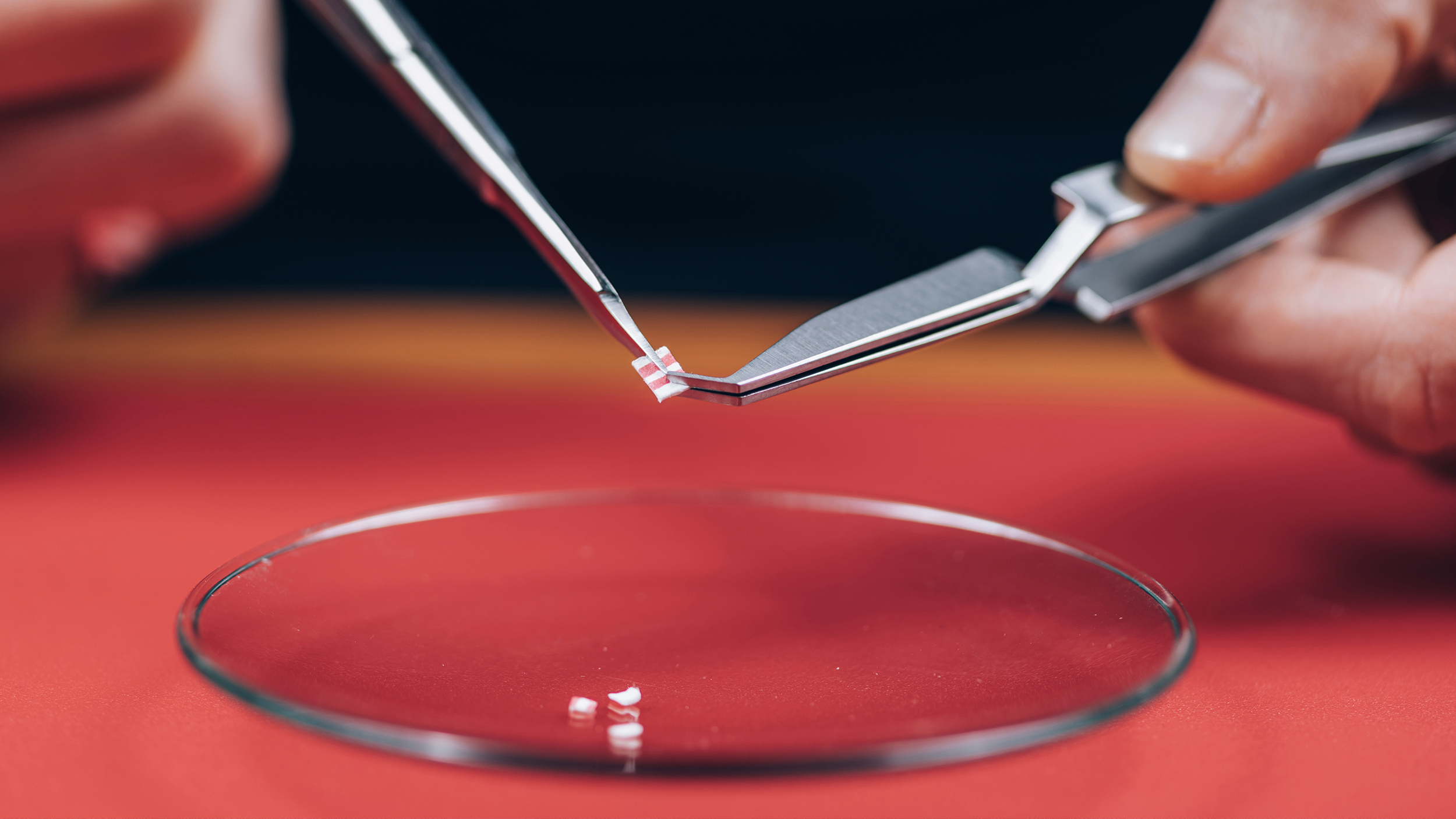Psychedelic research is enjoying a renaissance. Recent studies have shown that psychedelic drugs like LSD and psilocybin seem to be a safe and effective method for treating conditions like depression, anxiety, and post-traumatic stress disorder.
And unlike common antidepressants, some people report long-lasting improvements in their mental health conditions after taking just one dose of psychedelics.
What makes these substances so unique and powerful? That’s one of the driving questions behind the research of Matthew W. Johnson, who has conducted numerous studies on the nature of addiction, psychedelics, and other psychoactive substances.
MATTHEW JOHNSON: These experiences are often called 'ineffable,' but as a scientist, I do my best to 'F- it up' by trying to describe it as much as I can, so I'll go ahead and do that: Our society has been in a mental health crisis and it's been stagnating. A large portion of people treat it with traditional antidepressants, don't see benefit. Psychedelics are the only drug class that I know of where you have not just one or two, but lots of stories of people saying they took this thing one time and they say it had this profound impact on the course of their entire life. They really exploded on the scene in the 1960s and were associated with some really radical changes to society. That really scared a lot of people. I think now society is more ready to kind of accept these compounds and the whole picture of them.
I'm Matt Johnson. I'm a Professor of Psychiatry at Johns Hopkins. I study drugs, principally, psychedelics.
It's hard to imagine a more interdisciplinary topic in the realm of drugs than psychedelics. They've apparently been used for time immemorial throughout many different cultures on the planet. Kary Mullis won the Nobel Prize inventing PCR, which revolutionized biology. He said he wouldn't have been able to do that had he not had experience in taking psychedelics. You move into the arts and then, I mean, gosh, I mean who hasn't heard of musicians and other artists claiming that psychedelics had a profound impact on their creativity? There's the Beatles before LSD, and then there's the Beatles after LSD- that's a big shift. The initial big wave of that scientific interest for psychedelics was in the 1950s. So this was about a decade after Albert Hofmann had first discovered the psychoactive properties of LSD. There was a group in Maryland called the "Spring Grove Group." A lot of early research there, particularly with cancer patients.
But I would say one of the most important groups in the history of this work was led by Abram Hoffer and Humphrey Osmond in Saskatchewan, Canada. They were really the first group that I would say developed what we now call "psychedelic therapy." There was this growing appreciation of some of the risks and the safeguards needed to minimize those risks, but not every investigator was aware of this. There was some unethical research, some wild research. There was controversy surrounding Timothy Leary, especially after he was fired from Harvard.
- 'Turn on, tune in, and drop out.'
JOHNSON: Psychedelics became so associated with the counterculture. Society was in a sense, traumatized. It all came to a halt. I mean, there were researchers that were running sessions and got the notices they just had to stop. The rug is pulled out for decades before there's a reinitiation. The research that's happening now, a lot of it is exploring medical applications. These are all drugs that can have a profound effect on one's sense of reality, including one's sense of self. I think kind of the only bet you can make is that if you have the dose high enough, something really interesting is gonna happen. You might find yourself in your 'mind's eye,' soaring in the heavens; the secrets of the Universe seemingly revealed to you. On the other hand, five seconds later it might collapse into what folks call a 'bad trip,' where one could feel that they're gonna die. It's sort of this like massive shake up in one's experience of reality. I'm floored when people with really substantial life experience will say things like, 'This was the most meaningful experience of their life.' Compared to the intensity of the subjective effects, it's remarkable how little impact these substances have on physiology. You know, your heart rate, your blood pressure- everything has its risk, to be clear. But compared to other drug classes, psychedelics are really robustly safe at the physiological level.
My therapeutic research with psychedelics is primarily used 'psilocybin,' which is the agent in magic mushrooms. The dose we now give to patients is anywhere from 30 milligrams to 40 milligrams, which Terence McKenna, who's the famous psychedelic bard would refer to repeatedly as the "heroic dose." If a microdose is over here and a recreational dose is over here, we're way over here. When someone comes in for the day of their psychedelic session, they've already spent several hours with us on previous days preparing for the experience, developing that rapport. We know that all drugs are in part shaped by the context in which they're given, but for the psychedelic substances, that's particularly more so. So when you provide it in more of a warm, welcoming situation, you tend to get more meaningful reactions to the substance. When the experience unfolds the person is gonna lay down, wear eye shades, and headphones through which music is played. So the idea is: kinda get out of your normal, everyday, discursive analyzing intellect. We really just encourage them to trust, let go, and be open. Trust the overall process. Going into this type of treatment is not easy at all. Trust yourself that you're robust: You're gonna get through this experience. Let go.
What does let go mean? Let go means whatever your preconceived notions of what this experience might be or what experience you should have, don't let that get in the way for the experience that you will have. Don't try to control it, and be open no matter where this takes you, go there. Whatever the experience is, take the orientation of: 'This is what I need to deal with.' The range of experiences are just so broad. You can swing from a terrifying experience to this beautific, you know, sort of like, most amazing experience of your life. Some people could feel like they've reached the end of reality, this kind of plane of existence. Others say that they can feel the suffering across the entire planet. You know, sort of having this sort of experience of 'universal empathy.' It's all welcome. The laughter, the tears, everything in between. That's exactly what this process is for. So the 'integration phase' is where we're discussing the experience with them, and the themes that come up are so varied. One of the aspects you could call 'revealed truth,' and I call these 'duh moments.' These are experiences where people will feel like they've learned something at such a fundamental level. I think of examples in our work we've done with cancer patients where, you know, oftentimes people will say, "I'm allowing this to create my own suffering. The cancer hasn't killed me yet. I can still live life, but I'm letting it do this to me." They knew it up here, they could tell you the words, but now they feel it in their bones- they feel it in their heart. People are reminded about this power they have to choose their own destiny.
Some people come out of these sessions as participants and say that, you know, "One 6-hour experience with psilocybin is like a thousand hours of therapy." But one of the pitfalls of this clinical work is that you'd be hard pressed to find a more intimate and vulnerable psychological intervention for a person. That's just a situation that is ripe for abuses if we don't have the right safeguards. Because of that vulnerability, because of the incredible gravity of these sessions, we need to even more tenaciously cling to clinical boundaries. We need to limit the use of therapeutic touch. A subtler form of abuse is just filling in the blanks for people- I call it the guru complex. People often confront big picture questions: What is the meaning of life? Does God exist? What's the big picture of everything that's going on? What am I? On those metaphysical questions, we really have to be silent. In the biggest picture, aside from psychedelic's ability to treat one disorder or another, I think they're just poised to really help us to understand the nature of psychiatric disorders. What commonalities do they have with each other that are somehow being addressed by psychedelic treatment? I kind of think of all of these disorders as different forms of addiction. So whether it's to a substance like tobacco or alcohol, cocaine, or a way of thinking about yourself, it's this narrowed mental and behavioral repertoire: reality used to be like this, and now your reality is like this. And psychedelics, when done well in the right setting, have the ability to just blow people out of that narrowed story. It holds a lot of promise in helping us figure out what it takes for the human being to be mentally healthy.
NARRATOR: Get smarter, faster, with videos from the world's biggest thinkers. To learn even more from the world's biggest thinkers, get Big Think+ for your business.







